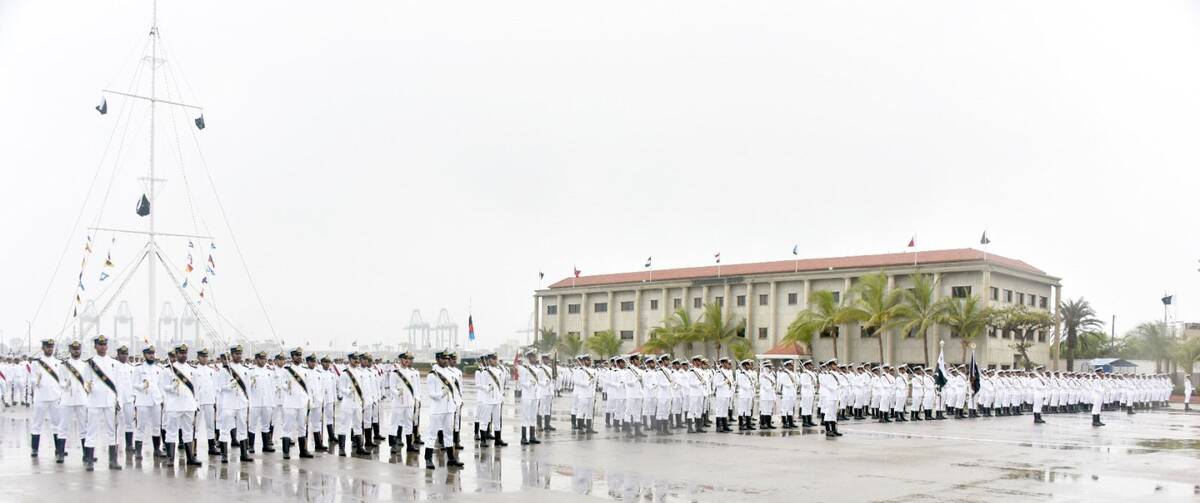SYDNEY: Speedster Spencer Johnson took 5-26 to propel Australia to a tense 13-run victory over Pakistan in Sydney on Saturday and seal their three-match T20 series with a game to go.
Set just 148 to win after Haris Rauf claimed 4-22 to keep the hosts in check, Pakistan were all out for 134 in the final over despite a lively 52 from Usman Khan.

Pakistan’s Usman Khan bats during the second T20 international cricket match against Australia in Sydney, Australia, on November 16, 2024. (AP)
Australia won a rain-hit first match in Brisbane by 29 runs with the final game at Hobart on Monday.
“We thought we were there or thereabouts and I thought the way the bowlers went about it was brilliant,” said Australian captain Josh Inglis.
“There’s so many options in this team I can go to. Every time I turned to Johnson tonight, he got a wicket. The way they played tonight was really good.”

Australia’s Marcus Stoinis shakes hands with Pakistan’s Haris Rauf after Australia won the T20 international cricket match against Pakistan in Sydney, on November 16, 2024. (AP)
Australia secured a vital breakthrough by removing Babar Azam (3) off Xavier Bartlett in the second over and Pakistan’s woes deepened when Johnson accounted for Sahibzada Farhan (5).
Runs were hard to come by and after facing 26 balls for 16, skipper Mohammad Rizwan knew he had to up the tempo.
But it cost him with Tim David taking a fine diving catch in the deep off Johnson, who then bagged Salman Agha next ball, caught behind by Inglis to leave Pakistan on 44-4 after 10 overs.
Khan played himself in and brought up his first T20 half-century.

Pakistan’s captain Mohammad Rizwan leaves the field after losing his wicket during the T20 international cricket match against Australia in Sydney, on November 16, 2024. (AP)
But Johnson struck again with Abbas Afridi (4) following soon after to earn the 28-year-old a maiden five-wicket haul in his seventh T20.
Two wickets in an over by spin king Adam Zampa piled the pressure on Pakistan who were unable to rise to the challenge.
Earlier, Australia was restricted to 147-9 after a rip-roaring start, but a slew of dropped catches cost Pakistan.
“If you take the positives, the boys bowled very well. We know Australia is not an easy team,” said Rizwan.
“But if you drop crucial catches, it will cost you the game.
“We all know the pitch wasn’t easy to bat,” he added.
Jake Fraser-McGurk and Matthew Short stitched together a highly entertaining 52-run opening stand off just 22 balls before Rauf struck twice in three deliveries.

Pakistan’s Sufiyan Muqeem (left) is congratulated by teammate Salman Ali Agha after taking the wicket of Australia’s Marcus Stoinis during the T20 international cricket match between Australia and Pakistan in Sydney, on November 16, 2024. (AP)
After tempting Fraser-McGurk (20) into another slog that was taken in the deep by Agha, he enticed a leading edge from Inglis (0).
Pakistan had their tails up and Short quickly followed for 32, bowled by Afridi, with three wickets falling for four runs.
Marcus Stoinis survived two dropped catches but finally fell on 14, reverse-sweeping to Sufiyan Muqeem, who was brought into side for Haseebullah Khan.

Australia’s Jake Fraser-McGurk bats during the T20 international cricket match between Australia and Pakistan in Sydney, on November 16, 2024. (AP)
Muqeem’s wrist-spin then took care of dangerman Glenn Maxwell (21) as the runs dried up.
David was removed by Rauf for 18 and he collected his fourth by bowling Bartlett (5).
Aaron Hardie made a handy 28 before Afridi removed him and Johnson in successive balls in the final over.


















